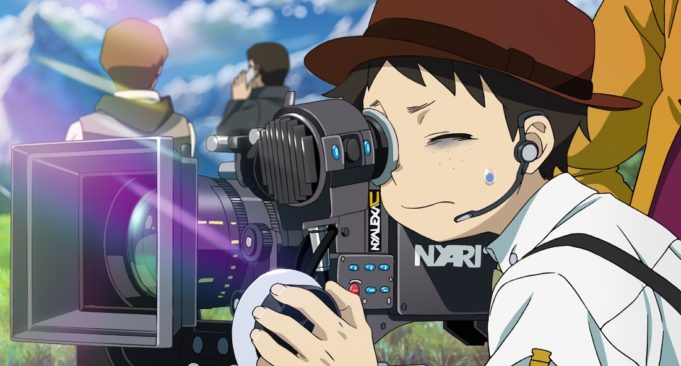If you have an anime fan in your house who’s curious about how movies are made, you should take them to Pompo: The Cinéphile, which plays at a number of multiplexes this Wednesday and Thursday, though AMC Grapevine Mills is the only one that has it for the full theatrical run. More than just a fun animated film for the kids, it’s one of the best movies I’ve ever seen about the filmmaking process. The other great anime film about movies is Satoshi Kon’s Paprika, and the highest praise I can offer Pompo: The Cinéphile is that it’s on that same level.
The film takes place in Nyallywood, an entertainment-industry mecca in southern California, where Gene Fini (voiced by Hiroya Shimizu in the Japanese-language version and Christopher Trindade in the English one) is a production assistant at Peterzen Films. Joel D. “Pompo” Pomponette (voiced by Konomi Kohara and Brianna Gentilella) is the studio chief and granddaughter of its founder, producing shallow but profitable entertainment — “If the lead actress looks attractive, then it’s a good movie,” she says. Nevertheless, she has written her own character-driven script entitled Meister, about an old orchestra conductor and a young girl. She taps Gene to direct it and unknown actress Natalie Woodward (voiced by Rinka Ōtani and Jackie Lastra) to play the female lead, while coaxing movie star Martin Braddock (voiced by Akio Ōtsuka and Kenneth Cavett) out of retirement to play the male lead.
This is based on a series of manga comics, and not for nothing is the film named after Pompo, whom we see organizing the scheduling and financing from Nyallywood, overseeing the shoot, and marketing a project that’s more to her than just another product. She may be a stereotypical anime girl with pigtails who’s always smiling and snacking on something sweet, but she’s full of sage advice about the business. This could have easily been a live-action film, but the animation allows for some fun touches — Gene imagines himself slashing through ribbons of celluloid with a flaming sword, and when Pompo complains about movies that run too long, her body inflates like a balloon. (Since you’re wondering, Pompo: The Cinéphile runs a bustling 94 minutes. Pete Davidson would like that.)
As he works on location in Switzerland, we see Gene improvise solutions when the weather turns against the filming and the farm they’ve rented doesn’t have enough goats. He’s quite talented, but he’s also lucky in that Pompo doesn’t meddle with his work and Martin takes it in stride when his suggestions are improved upon or even rejected outright. Even then, it takes a clever last-minute intervention by one of Gene’s high-school classmates (voiced by Ryūichi Kijima and Jonah Platt), who now hates his job as an investment banker, to save Meister. Most movies about filmmaking concentrate on the shooting, but this one shows us Gene’s lonely, tedious, caffeine-blurred days in the editing bay as he tries to wrangle 72 hours of footage into a film short enough to present to audiences.
Writer-director Takayuki Hirao does more than just take us behind the scenes, he shines light on the single-minded devotion that Gene needs to finish Meister. Like the conductor who is his film’s protagonist, Gene thinks, “You need to sacrifice everything, not just yourself but the people around you. Cut out family! Cut out friendship! Cut out daily life!” No wonder directing movies attracts far more malignant types than Gene, rather than well-adjusted human beings. In his directing debut, Gene rediscovers why he wanted to make films. Just as he once found salvation in the stories he saw on the big screen, he hopes his films can save someone else. Pompo is right: Happy people don’t go to all this trouble to create something, much less to become rich and famous. They do it because, like Gene, they yearn to connect with someone out in the darkness. When they do, that’s success.
Pompo: The Cinéphile
Voices by Hiroya Shimizu, Konomi Kohara, Christopher Trindade, and Brianna Gentilella. Written and directed by Takayuki Hirao, based on Shogo Sugitani’s manga series. Not rated.












